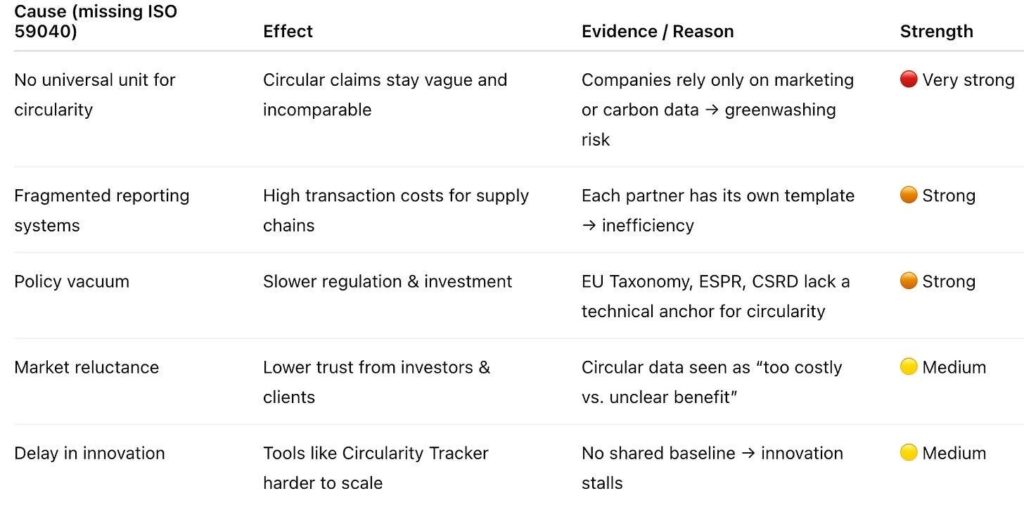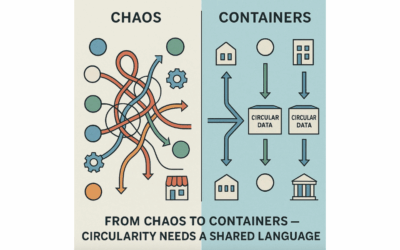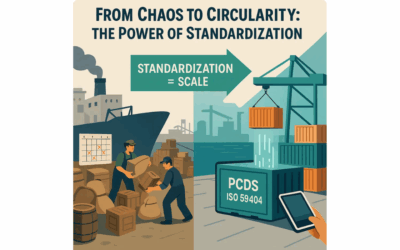Most “green” claims are vague or false. ISO 59040 is the only thing standing between real progress and endless greenwashing.
Back in time, before ISO 59040 even had a name, we faced a familiar frustration: products labeled eco-friendly or 100% recyclable, yet impossible to prove.
Together with a small group of experts, I decided this had to change.
That decision marked the beginning of the Product Circularity Data Sheet (PCDS) initiative. Our goal was clear: to create a system that made product circularity measurable, comparable, and verifiable. Years later, that initial effort evolved into what is now known as ISO 59040 – the international standard for circular economy defining how circular characteristics are described and shared across industries.
But still now, the question of how we can measure circular economy remains.
Today, everyone in the circular economy speaks about recycling, reuse, or low-carbon products. Yet, without a universal method to measure circularity, these discussions remain inconsistent and often misleading.
Many of us have experienced the frustration of buying a “100% recyclable” product, only to discover that local facilities cannot process it.
That is precisely what a world without ISO 59040 looks like: claims without proof, and promises without delivery.
The turning point in the circular economy was not new materials or business models, but the creation of ISO 59040, the Product Circularity Data Sheet standard.
Without it, circularity would still be just another buzzword, and measuring product circularity would be impossible.
Visionary Perspective
The success of the circular economy depends on a single principle: trust in data. Just as the kilogram created consistency in global trade and the shipping container standardized logistics, ISO 59040 establishes a universal method for measuring and communicating product circularity. It transforms sustainability from subjective claims into verifiable, data-driven accountability. Without it, progress in the circular transition would remain fragmented and too slow to scale.
Professional Perspective
For companies, policymakers, and investors, ISO 59040 cannot just be considered a minor technical specification. It is the data infrastructure enabling transparent and comparable circularity reporting.
Without this shared standard…
- Each supply chain partner would operate on different data models and templates.
- Transaction costs would rise due to inconsistent reporting.
- EU frameworks such as CSRD, ESPR, and the upcoming Digital Product Passport (DPP) would lack a harmonised technical foundation.
- Innovation tools like Circularity Tracker would face integration barriers, slowing adoption.
Empirical evidence highlights why a standard like ISO 59040 is essential. According to a European Commission study (2020) analysing 150 products, 53.3% of green claims were vague or misleading, and 40% lacked any evidence. Without internationally recognised standards, this information gap leads to greenwashing and undermines corporate sustainability credibility.
Citizen Perspective
From a consumer standpoint, the challenge is equally clear.
Imagine standing in a supermarket aisle in front of two bottles both marketed as “sustainable.” One is genuinely recyclable, the other is not.
How do you know the difference?
Without ISO 59040, citizens have no way to verify the difference. With it, circularity claims become measurable, comparable, and traceable, providing the same level of clarity and reliability as a nutrition label for environmental performance.
Reality Check (Counterfactual Map)

ISO 59040 did not emerge alone.
It was developed through collaboration among European industry leaders, public institutions, and policy pioneers in Luxembourg, ensuring both technical rigour and institutional legitimacy.
This collective effort has allowed ISO 59040 – the Product Circularity Data Sheet (PCDS) standard – to become the global reference point for circularity data.
For professionals in policy, business, and sustainability, the debate is no longer about whether standards matter. It is about what kind of future the circular economy will have.
One defined by measurable, verifiable data, or one lost in unsubstantiated claims and fragmented reporting?
ISO 59040 determines whether circularity becomes a credible framework for global trade or remains just another sustainability slogan.
Recognising the importance of ISO 59040 means understanding the larger transformation it enables:
- From materials to measurement.
- From claims to comparability
- From greenwashing to accountability..
The question is no longer “Do we need ISO 59040?”
It’s “Can a truly circular economy exist without it?”
From Standard to Practice – The Role of CircularTracker
Standards only create impact when they are implemented at scale. That is why CircularTracker, developed by +ImpaKT (part of SWECO), was designed to translate ISO 59040 into practice – turning the Product Circularity Data Sheet (PCDS) framework into a tool that every organisation can use to measure and communicate product circularity data effectively.
CircularTracker is an advanced circularity measurement platform that enables companies and public institutions to assess, compare, and showcase product circularity in a standardised, transparent, and cost-efficient way.
Built directly on the ISO 59040 Product Circularity Data Sheet standard, it converts complex product information into clear, visual dashboards that make circular performance metrics accessible to teams, clients, and regulators providing organisations with:
- Standardised and future-proof data, fully aligned with ISO 59040 and ready to act as a light Digital Product Passport (DPP).
- Quick and affordable assessments that deliver a complete 360° view of circularity without compromising data confidentiality.
- Visual and transparent reporting tools that make it easier to communicate sustainability performance internally and externally.
- Compliance-ready outputs to support CSRD and ESPR requirements.
- Comparability across product portfolios, enabling benchmarking and strategic decision-making.
CircularTracker is already in use across construction, manufacturing, and textile sectors, empowering organisations to demonstrate leadership in circular economy practices, respond effectively to client transparency demands, and prepare for the next generation of EU sustainability regulations.
By bringing ISO 59040 to life, CircularTracker ensures that circularity moves from buzzword to benchmark – making measurable, verifiable, and comparable circularity data accessible for businesses worldwide.
The solution: CircularTracker
Try CircularTracker out for free: https://circulartracker.eu/
And if you believe circularity should move beyond buzzwords, share this article with one policymaker, one colleague, or one company you know.
The sooner ISO 59040 becomes the norm, the sooner we can cut through the fog of greenwashing and make circularity measurable, comparable, and real.




0 commentaires